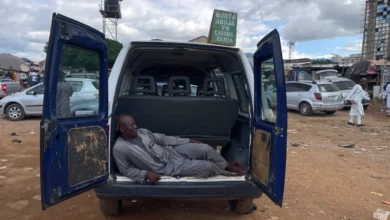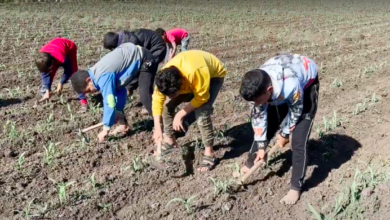Naglaa Mahdy sleeps in a tent with ten other women and their children. She wakes up and dusts herself off, then she tries to figure out how to feed herself and her family on her tiny budget.
Mahdy is one of over 1000 people who, after being evicted from their rented apartments in February, have been living in tents in Medinat al-Salam.
After cooking on a stove she borrowed from another tent (all of her home appliances have been stolen), Mahdy spends the rest of the day waiting for representatives from the governorate, who visit periodically to assess the families and determine who deserves an apartment.
This is life in the Medinat al-Salam tent city. Some residents have brought their protests to central Cairo and attracted attention to their cause, but many more continue their threadbare existence under canvas.
Mahdy is still mourning the loss of her baby, who was born prematurely a week ago. The baby died three days later because Mahdy couldn’t afford the necessary medical treatment. Despite her physical and emotional pain, Mahdy still congregates with the other residents of the tent city whenever a governorate representative arrives. She is desperately trying to secure an apartment for herself, her husband and her remaining two children.
During the security vacuum that began on 28 January, landlords in Medinat al-Salam worried that tenants would take over their apartments and refuse to leave when their contracts expired. In a preemptive move against having their apartments stolen, landlords terminated renters’ contracts and evicted them from their homes.
In February, the evicted families were promised apartments within a month and housed in tents in the Sbiko area in Medinat al-Salam under orders from Prime Minister Essam Sharaf.
Early this month, the governor of Cairo announced the allocation of 126 apartments for the evicted residents, and a renewed investigation into the cases of another 293 families. The rest of the tent city’s residents were deemed undeserving by the governor, who claimed that they had already received apartments.
They deny the governor’s claims and complain that the majority of the apartments were allocated to people from other areas. The tent dwellers assert that they have no other assets, despite the governorate officials’ claims that they do. The tent dwellers say this is simply a ruse on behalf of the authorities to justifiy denying compensation. The residents say that although there is a minority of “powerful people” among them who have assets, most families have next to nothing.
“If I had any assets, would I have exposed myself and my kids to this unbearable life?” said Marwa Zawam, one of the residents.
Residents say that those among them with connections and money are making trouble for the rest of them. They say that these people bribe governorate workers to allocate apartments for them, and keep other families from making contact with officials.
Every tent, the size of a small room, houses ten families. Women and children sleep in the tents at night while the men keep watch. Come daybreak, the women and children step outside and the men file in for their turn at sleeping.
Sleeping on a thin cover, the residents spend the night on the sandy floor, an arrangement that many say has given them breathing problems.
Warda Zeid has been in and out of hospitals for the past six months with two of her three children who have allergies.
“This child starts getting convulsions in the middle of the night; I take him and run to the hospital. I don’t know what to do,” says Zeid, holding her three-year-old child.
There is only one bathroom for the entire tent camp. It is made of cubicles with a hole in the floor and a light sheet for a cover. The women complain of the lack of privacy and say they’re scared to go to the bathroom at night.
With nothing but a rope to secure the entrance to each tent, residents say they are subjected to frequent attacks by criminals. Some local thieves use the camp as a hiding place after committing crimes in the neighborhood, while others have taken to stealing appliances belonging to the homeless familes.
After repeated attacks on the tents and the rape of an 8-year-old boy, the men, whose work was already severely affected by the slumping economy, stop working completely. Instead, they stay with their families for protection, relying for financial support on friends and relatives.
Aside from the harsh living conditions, residents suffer most from feelings of humiliation.
“This is not a life. We’re living here in the dust and filth. Why don’t they want to give us apartments like the rest of the people? Are they better than us?” said Soad Mahmoud, a mother of three.
Fed up with life in the tents and claims by the Cairo governor that they don’t deserve apartments, hundreds of Medinat al-Salam residents began an open sit-in outside the state radio and television building at Maspero, over three weeks ago.
“At least here people can see us and we can get our voices heard,” says Ahmed Ali Mohamed, a protester in front of Maspero.
Sitting among a pile of documents he acquired concerning the legal processes he went through to get an apartment, Mohamed contemplates his only two remaining options: to become a criminal or commit suicide.
He filed demands to the general prosecutor and the military prosecutor asking for an apartment and acquired an assessment from the governorate’s office proving that he deserves one. So far, nothing has been delivered. “I have six kids. The only thing left for me to do is carry them all and jump in the Nile,” says the 55-year-old as he stares into the river.
The Maspero protesters have encountered their share of hardships. Other than the expected difficulty of sleeping on the floor in the hot weather, all the public bathrooms around Maspero were closed down, some not allowing them in and others charging protesters to use them.
“Will I eat or drink or use the bathroom?” asks Dalia Zaki, struggling to make ends meet after her husband left his job to protect her and their thee-year-old.
As a result of the lack of facilities, four of the Maspero protesters, including a five-year-old child, have drowned in the Nile while bathing since the sit-in began.
Medinat al-Salam residents, desperate for a shelter, direct much of their frustration toward the government.
“I say to the Prime Minister: Have pity on these people. Why are you doing this to us? Where is the promise that you gave us?” said Zaid.
“Is it possible that the Field Marshall Tantawy hasn’t heard about us after we’ve been here for 20 days? Why isn’t he starting an investigation to see who’s lying: us or the Governor?” asks Mohamed.




